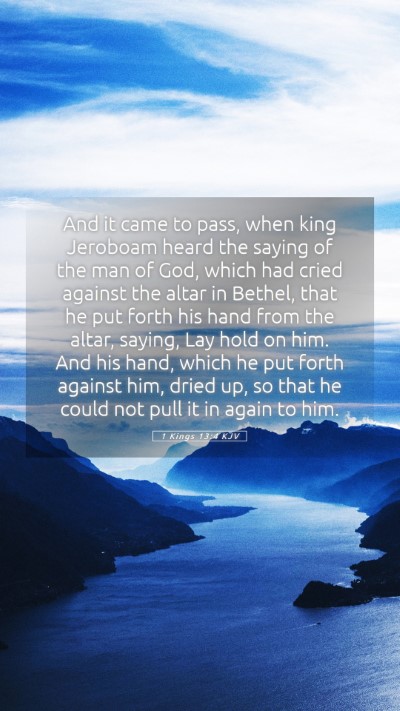1 Kings 13:4 - Understanding the Bible Verse
This analysis provides valuable insights into 1 Kings 13:4, exploring interpretations, meanings, and applications rooted in established Bible commentaries by notable theologians like Matthew Henry, Albert Barnes, and Adam Clarke. This verse falls within a critical narrative concerning prophecy and divine judgment.
Contextual Overview
1 Kings 13:4 states:
"And it came to pass, when king Jeroboam heard the saying of the man of God, which had cried against the altar in Bethel, that he put forth his hand from the altar, saying, Lay hold on him. And his hand, which he put forth against him, dried up, so that he could not pull it in again to him." (1 Kings 13:4 KJV)
Key Themes in 1 Kings 13:4
- Divine Authority: The verse highlights the powerful assertion of God's authority over the kingship of Israel.
- Prophetic Warning: The actions of the prophet serve as a warning against idolatry and rebellion.
- Instant Judgment: The immediate consequence of Jeroboam's antagonism exemplifies the swift judgment of God.
Biblical Commentary Insights
Insights from Matthew Henry
Matthew Henry emphasizes that this incident serves as a dramatic reminder of the power of God and how it manifests through His chosen prophets. The king's attempt to silence the prophet demonstrates humanity’s tendency to react with hostility towards divine revelations.
Insights from Albert Barnes
Albert Barnes stresses the significance of God’s punishment on Jeroboam’s hand as a visible sign of divine displeasure. This event emphasizes that resistance to God’s message not only leads to spiritual repercussions but indeed physical manifestations, showcasing God's control over all aspects of life.
Insights from Adam Clarke
Adam Clarke delves into the character of Jeroboam, expressing that his actions reflect a deeper spiritual blindness. His urgency to attack the man of God symbolizes broader resistance against divine will. Clarke indicates that Jeroboam’s error lay not just in his reaction but in the overall position he took against God’s ordained servants.
Application in Today's Context
In our daily lives, 1 Kings 13:4 challenges readers to consider their responses to divine warnings and guidance. It serves as a caution against dismissing spiritual truths in favor of personal desires or societal pressures.
Lessons for Bible Study Groups
This Bible verse provides ample material for discussion in bible study groups. Participants can explore themes of authority, rebellion, and accountability. Consider these points for discussion:
- How do we respond to divine guidance in our lives?
- What does this passage teach us about the dangers of authority without accountability?
- In what ways can we emulate the prophet’s boldness in proclaiming truth?
Cross References
This verse resonates with several other passages:
- 2 Chronicles 13:10-11: Speaks on the established worship practices and consequences of idolatry.
- 1 Kings 12:28-33: Provides background on Jeroboam's establishment of altars and the consequences of idolatry.
- Jeremiah 7:9-10: Discusses hypocrisy and the false sense of security in the worship of corrupt practices.
Conclusion
In conclusion, 1 Kings 13:4 fundamentally underscores the themes of obedience and judgment. By delving into Bible verse meanings through scholarly insights, we enhance our understanding and ability to apply Scriptural lessons to our lives. This verse acts as a powerful reminder of the necessity of aligning our actions with divine will, thereby fostering a more profound relationship with God.


